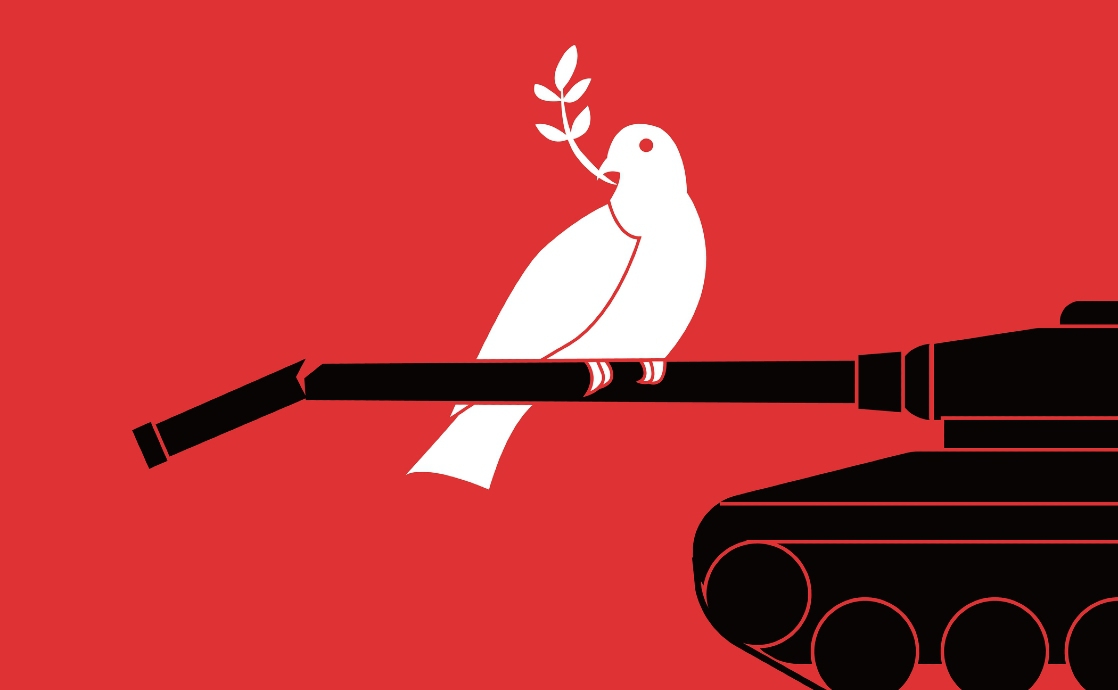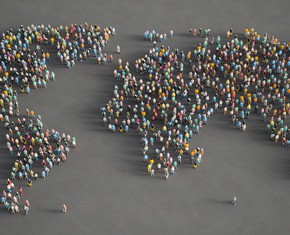The views expressed in our content reflect individual perspectives and do not represent the authoritative views of the Baha'i Faith.
How can we talk about peace when so many wars rage? Just discussing world peace now feels futile and fruitless – even though we all know that someday the human race must cease waging war.
If we don’t, we can only look forward to destruction and dystopia, which no sane person wants to witness. Our weapons now have the capacity to destroy human civilization – so we have to find a way to stop war before those weapons stop us.
Here’s one of the key questions we need to answer: against the backdrop of a complex and controversial global discussion about political and economic interests, who determines the validity of freedom of speech, international law, and human rights in such times? The 5th century BC statement attributed to Aeschylus, “In war, truth is the first casualty”, has been repeatedly confirmed and likely holds true today.
Isn’t it disheartening that humanity, after two catastrophic world wars, finds itself in an unending series of further wars, increasingly hinting at the danger of a new world war? The underlying dynamics behind their emergence have changed little: territorial and power claims legitimized by prejudices, often deliberately reinforced by those in power.
RELATED: Enemy Images and the Causes of War
The world’s current wars, like many recent ones, are internationally condemned wars of aggression. They come with unbearable human suffering and likely severe geopolitical repercussions. These wars are not just regional in nature – they have far-reaching consequences on a global scale, well beyond the directly-affected countries, with significant social and economic implications. They have the potential to dramatically intensify hunger, poverty, medical emergencies, and polarization of entire societies, not to mention the irreversible effects on climate change due to weapons production and use.
All of this leads us to one place – we must talk about war and peace.
Without presuming to judge specific solutions, however, some thoughts seem essential as a prerequisite for these important discussions, whether in personal or broader contexts such as interreligious dialogue. The Swiss writer Friedrich Dürrenmatt, known for his apocalyptic 1961 drama “The Physicists,” where he theatrically explored the possibility of humanity’s destruction by a secret bomb, cautioned: “One must never cease to imagine the world as it would be most reasonable.”
We all understand the eminently reasonable idea that a concrete, comprehensive, secure world peace paves the way for humanity’s future. The Baha’i teachings have emphatically pointed that fact out since the middle of the 19th century, as in these passages from the writings of Baha’u’llah:
… these fruitless strifes, these ruinous wars shall pass away, and the ’Most Great Peace’ shall come …. Yet do We see your kings and rulers lavishing their treasures more freely on means for the destruction of the human race than on that which would conduce to the happiness of mankind …. These strifes and this bloodshed and discord must cease, and all men be as one kindred and one family …. Let not a man glory in this, that he loves his country; let him rather glory in this, that he loves his kind …
In light of that penetrating wisdom, let’s look at three elements as essential prerequisites to lasting global peace.
On Freedom of Speech
How can we learn from the ever-recurring echoes of history?
Before we hastily form opinions about newly emerging wars, we should first inform ourselves about their background and history. Only then does any debate appear in an appropriate light because the connections are, in reality, much more complex and complicated than what the images and the media assessments ever reveal. Images and assessments primarily evoke feelings, but they do not necessarily aid in understanding; sometimes, they even hinder it. This means that future perspectives must be conceived mainly in a manner “most reasonable,” based on historical fact rather than emotionality.
Does that approach threaten our freedom of speech? Even in the art world, which thrives on freedom, a dispute is now arising about what can still be said and thought. The same applies to interreligious dialogue.
So we need to make a distinction in this debate about war: between, on the one hand, established facts that leave no room for doubt and, on the other hand, the effort towards truth-finding, understanding underlying causes, and discovering possible solutions for conflicts. This process always begins with listening to and seriously considering a variety of different opinions, even if that is difficult.
On Truth-finding
None other than the German-Jewish thinker and publicist Hannah Arendt, who immigrated to the USA after the Nazi seizure of power, wrote in her 1967 essay “Truth and Politics”:
No one has ever doubted that truth and politics are on rather bad terms with each other, and no one, as far as I know, has ever counted truthfulness among the political virtues. Lies have always been regarded as necessary and justifiable tools not only of the politician’s or the demagogue’s but also of the statesman’s trade.
This critical analysis from the time of the Vietnam War seems no less applicable to the wars of the 21st century.
How do we deal with this issue in times when public discourse is additionally unsettled by intentionally-fabricated propaganda? As always, we conduct a search to find the truth. The encounter of different opinions always marks the beginning of a truth-finding process, whether in personal spheres, interreligious forums, or wherever. In practical life, this means that only the often painstaking path of consultation – you may also call it “discussion” or “dialogue” – according to Baha’i writings, can lead, step-by-step, to truth-finding. Abdu’l-Baha, in his writings, said “… the shining spark of truth cometh forth only after the clash of differing opinions.”
It is crucial that, in an attitude of mutual respect, all presented alternatives or opinions are allowed, and all participants feel free in expressing their opinions.
The ability to find truth despite a diversity of opinions is particularly valuable in times of crisis to avoid polarization and division.
The lack of political truthfulness lamented by Arendt contributes significantly to uncertainty, loss of trust, and polarization. A loss of consensus on important societal issues, in other words, a loss of the ability to make decisions that can be equally supported by everyone, can endanger democracies dependent on it for their survival.
RELATED: The Doomsday Clock: Now 90 Seconds to Midnight
On Peace as a Concern of All Humanity
The past wars of the 20th and 21st centuries speak a clear language: there were only losers.
With globalization and the emerging division of the world into ever more alienated geopolitical blocs, this trend could easily worsen. More armament brings no solution. Before these hopeless and destructive wars, Baha’u’llah, the founder of the Baha’i Faith, wrote about the absolute necessity of a worldwide peace:
Such a peace demandeth that the Great Powers should resolve, for the sake of the tranquillity of the peoples of the earth, to be fully reconciled among themselves. Should any king take up arms against another, all should unitedly arise and prevent him. If this be done, the nations of the world will no longer require any armaments, except for the purpose of preserving the security of their realms and of maintaining internal order within their territories. This will ensure the peace and composure of every people, government and nation.
Ensuring peace as a joint task of all nations of the world is, therefore, the unavoidable perspective for the future well-being of humanity.
With the establishment of the League of Nations and the United Nations, this path toward collective security thinking has already begun. We must ensure that it continues – our survival as a species depends on it.
According to the Baha’i teachings, there is only one humanity. Consequently, the entire human race is to be regarded as a family – beyond all borders, whether national, religious, or ethnic. Although we are far from achieving social justice, and the dismantling of borders represents a challenging path everywhere, our compassion for people suffering from wars and distress must be comprehensive. Above all, one-sided compassion must not lead to hatred, because hatred can easily be used to justify wars.
Before the First World War, in 1911, during a speech in Paris, Abdu’l-Baha called on his listeners to “show compassion and goodwill to the whole of humanity” and to “render service to humanity.“
The growing polarization in our society and the world at large is undoubtedly an inheritance of the past. We must progress beyond that past. The Baha’i teachings urge us to align our inner compass with the well-being of the entire human race. We can hope for a peaceful future if we put our thoughts and actions in the service of others – whether in our personal environment, our region, and preferably on a global scale.
An earlier version of this article first appeared in German here: https://www.perspektivenwechsel-blog.de/bahai-artikel/krieg-und-frieden
















Comments
Sign in or create an account
Continue with Googleor